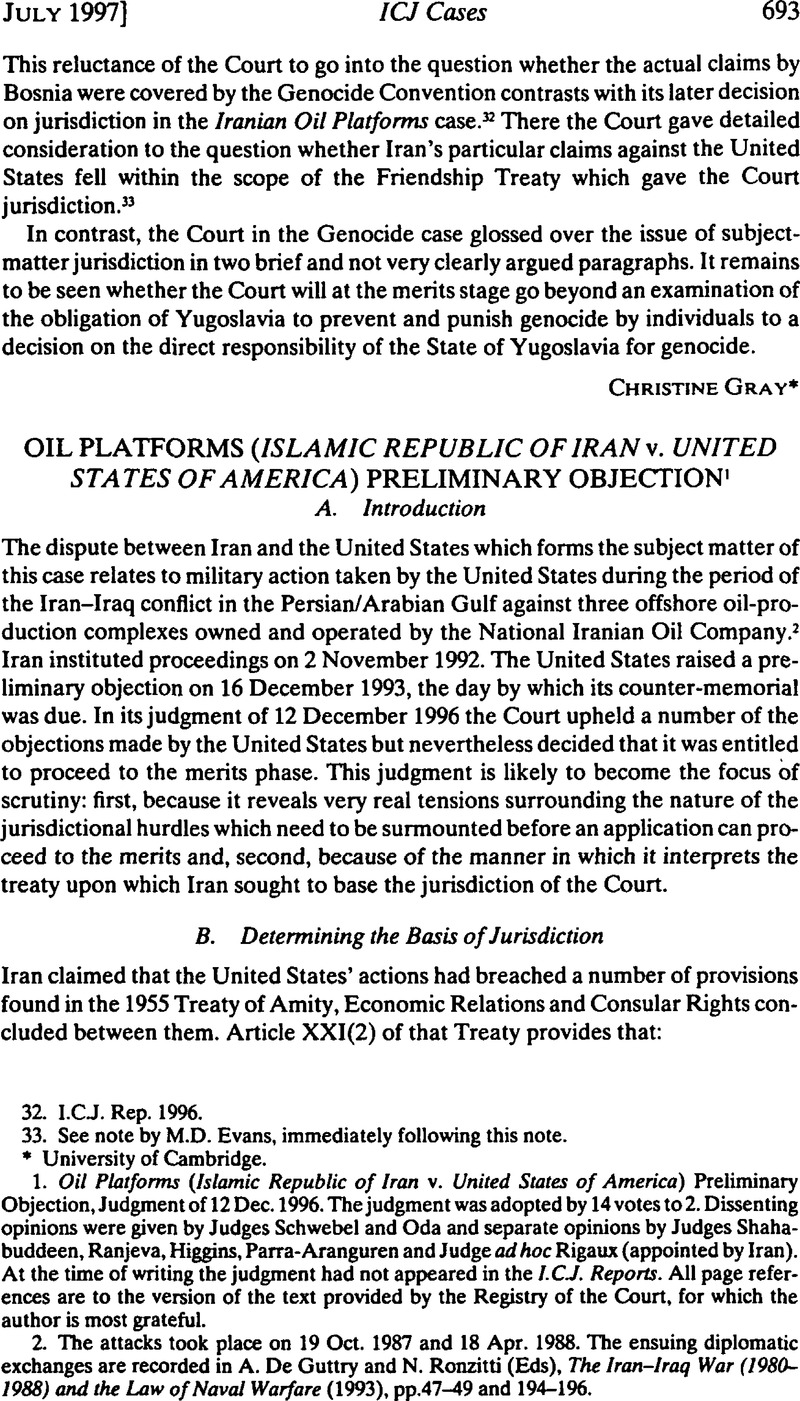Published online by Cambridge University Press: 17 January 2008

1. Oil Platforms (Islamic Republic of Iran v. United States of America) Preliminary Objection, Judgment of 12 Dec. 1996. The judgment was adopted by 14 votes to 2. Dissenting opinions were given by Judges Schwebel and Oda and separate opinions by Judges Shahabuddeen, Ranjeva, Higgins, Parra- Aranguren and Judge ad hoc Rigaux (appointed by Iran). At the time of writing the judgment had not appeared in the I.C.J. Reports. All page refer- ences are to the version of the text provided by the Registry of the Court, for which the author is most grateful.
2. The attacks took place on 19 Oct. 1987 and 18 Apr. 1988. The ensuing diplomatic exchanges are recorded in De Guttry, A. and Ronzitti, N. (Eds), The Iran—Iraq War (1980–1988) and the Law of Naval Warfare (1993), pp.47–49 and 194–196.Google Scholar
3. Judgment, para.16.
4. Mavrommatis Palestinian Concessions, P.C.I.J., Ser.A, No.2.
5. Judge Shahabuddeen, separate opinion, p.5.
6. Ambatielos, Merits, Judgment, I.C.J. Rep. 1953, 10.Google Scholar
7. Judge Shahabuddeen, separate opinion, p.2.
8. Application of the Convention on the Prevention and Punishment of the Crime of Genocide, Judgment of 11 July 1996. See C. Gray, above.
9. Judge Ranjeva, separate opinion, pp.1–3. See also Judge ad hoc Rigaux, separate opinion, pp.2–4. This would suggest that the Court would have been required to take a definite view concerning the US's argument that the Treaty as a whole was irrelevant to the factual circumstances of the case but, as will be seen below, this was not directly addressed by the Court at all.
10. Judgment, para.25.
11. Idem, para.26.
12. Idem, para.28.
13. Idem, paras.33–34.
14. Judge Higgins, separate opinion, para.39. It is also difficult to see how the obligation to “assure that their lawful contractual rights are afforded effective means of enforcement” could be other than territorial in scope.
15. Judgment, para.36.
16. Judge Parra-Aranguren, separate opinion, para.3. See also Judge ad hoc Rigaux, separate opinion, p.2, who seems to take a similar view.
17. Judge Shahabuddeen, separate opinion, p.11.
18. Judgment, para.38.
19. Idem, para.40.
20. Idem, para.41.
21. Ibid.
22. Arts.VIII and IX. See Judge Higgins, separate opinion, paras.40–41.
23. Judge, Schwebel, dissenting opinion, pp.9–10.Google Scholar
24. Judgment, para.49.
25. More controversial is the Court's assertion that the very title of the Treaty points towards an expansive approach because it refers not to “commerce” but to “Economic Relations” (idem, para.47). This rather implies that the word “commerce” should be interpreted in a broader fashion in a treaty dealing with economic relations than in a treaty dealing with commerce. This is untenable. The difference in title surely reflects a broader subject matter, not an intention to bestow different interpretations on identical words or phrases.
26. Judgment, para.50.
27. Idem, para.51.
28. Cf. judgment, para.50. The Court and Judges Schwebel and Higgins all drew on the Oscar Chin case (P.C.IJ. Ser. A/B, No.63) when considering how broad an interpretation the term “commerce” could bear.
29. Judge Schwebel, dissenting opinion, p.11.
30. Forward contracts for the purchase of oil (or other commodities) yet to be produced might be difficult to accommodate within his or Judge Higgins's framework.
31. Judge Higgins, separate opinion, para.50. Judge Higgins therefore thought the Court lacked jurisdiction over the actions against the Salman complex, where no allegations concerning its transportationl functions had been made (idem, para.51). The Court, however, noted that they were connected to the other facilities by an undersea pipeline (judgment, para.50). An alternative view would have been to see “transportation” as a commercial activity in its own right (as in Oscar Chin, supra n.28). The problem with viewing transportation as a free-standing act of commerce would be that it would cease to be integral to “commerce” between Iran and the US, as expressly required by Art.X(l).
32. Judgment, para.18.
33. Judge Schwebel, dissenting opinion, p.2. This included the Court's own assessment of the 1955 Treaty in the Hostages case, when it said of it: “The very purpose of a treaty of amity … is to promote friendly relations between the two countries concerned…, more especially by mutual undertakings to ensure the protection and security of their nationals in each other's territory” (United States Diplomatic and Consular Staff in Tehran, I.C.J. Rep. 1980, 28).Google Scholar
34. Judgement, para.20.
35. Military and Paramilitary Activities in and against Nicaragua (Nicaragua v. United States of America), I.C.J. Rep. 1986, 14, paras.222 and 271.Google Scholar
36. Judgment, para.20.
37. Idem, para. 13. Cf. Judge Schwebel, separate opinion, p.6, who thought it should be addressed at the jurisdiction phase.
38. In his dissenting opinion Judge Oda argued that the Court ought not to exercise jurisdiction on the basis of cotnpromissory clauses in bilateral treaties which raised questions concerning their “object and purposes”, as opposed to their interpretation and application. He thought that the object and purpose of such treaties were conclusively settled with the meeting of minds that was necessary for the conclusion of such a treaty. To allow such claims would, he thought, encourage the creation of disputes which appeared to fall within the terms of the treaty but which were in fact unconnected with it, thereby inviting cases “by the back door”. His solution might be overly restrictive, but Judge Oda clearly marks out the problem with the Court's approach. Of course, the Court would claim that this case does raise issues of interpretation, rather than of ascertaining its object and purposes.